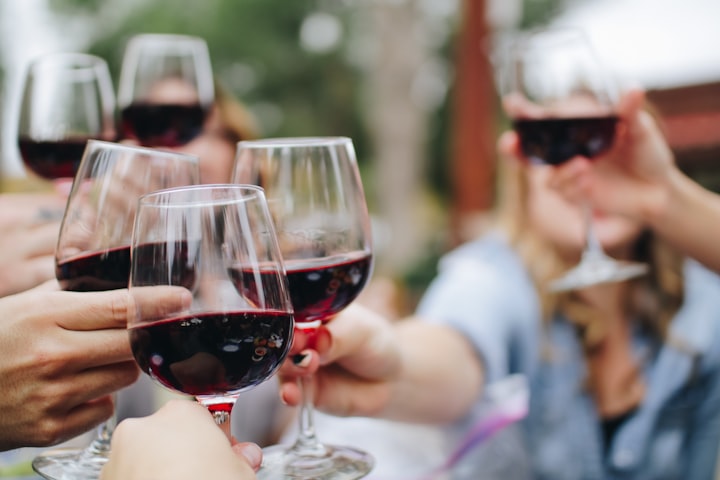Red Wine for weight loss? Science says YES
Weight loss

Have you considered using wine in your weight-loss diet? The majority of individuals believe that alcohol contains empty calories and is a weight-loss saboteur. In fact, if your friend is trying to lose weight, she'll probably avoid alcohol entirely and instead drink no-calorie or low-calorie beverages like lemon water or sparkling water. Science, on the other hand, is beginning to demonstrate a completely opposite point. Wine can be a beneficial element of your weight-loss regimen, according to research. Does it seem too good to be true? Let's take a look at how wine can help you lose weight.
Resveratrol for weight loss
Resveratrol is a polyphenol that can be found in red wine. This strong antioxidant has been the subject of a lot of research, with many people praising it for its health advantages. Resveratrol is well-known in the anti-aging community for its ability to prolong life. It also improves cardiovascular health by avoiding blood vessel deterioration, lowering cholesterol, reducing the danger of blood clots, and reducing inflammation, which is a known precursor to heart disease.
But, more recently, research has revealed that resveratrol can help people lose weight in a healthy way. It accomplishes this by transforming one fat type into another. A 2015 study describes how resveratrol helps weight loss and obesity prevention by converting white fat to beige fat.
White fat, Beige fat, and brown fat
White fat, beige fat, and brown fat are the three forms of fat found in the human body. We want to lose white fat since having too much of it can be hazardous. White fat, also called adipose tissue, cushions our interior organs, generates hormones, and stores lipids. While we require it in order to function, we do not require it in excess. Excess white fat, in fact, can contribute to more than just obesity. Type 2 diabetes, sleep apnea, and possibly cancer have all been related to it. For men, the appropriate quantity of white fat in the body is 15 percent to 25 percent, and for women, 15 percent to 30 percent. Much more than that is a serious health hazard.
Brown fat, on the other hand, burns the lipids stored in white fat and converts them to heat. Brown fat, also known as brown adipose tissue, is formed while sleeping, exercising, and even venturing outside in the cold. So, when it gets cold outside, go for those blustery walks to reduce weight! While brown fat is usually referred to as "good fat," it isn't the only type that has health benefits.
Beige fat is also found in our bodies. Beige fat is a newer discovery made from white fat during a biological process known as "browning." Obesity is prevented by this "browning" mechanism. The browning process is aided by resveratrol, according to science. As a result, beige fat is beneficial. Because of the resveratrol concentration in red wine, it can turn white fat into beige fat.
Is timing everything?
It goes without saying that having a glass of red wine for breakfast is not a good idea. It's true what they say: timing is everything. According to one study (which used bees), the optimum time to drink wine for weight loss is at night. Before going to bed, many of us find ourselves nibbling. Perhaps we haven't eaten enough throughout the day, or perhaps the mindless nibbling that comes with watching a good movie or reading a good book is the highlight of our day. Whatever the cause for late-night eating, it's a guilty pleasure that most of us are all too familiar with.
Have you ever tried replacing it with a glass of red wine? It has the potential to reduce nocturnal snacking while also encouraging weight loss. If red wine makes you eat more, don't drink it. You are the most knowledgeable about your own body. However, many of us find that a late-night drink of red wine suppresses our appetite, making it simpler to lose weight as we sleep. Note that a glass of water is always preferable to a bottle of Cabernet by your nightstand!
Not a wine drinker?
You don't have to drink red wine if you don't like it. Eating dark berries has similar health advantages. Resveratrol is found in strawberries, grapes, and blueberries. If you're worried about the negative effects of wine, try these fruits instead. They'll provide you with the same amount of resveratrol as wine, if not more. It's probable that some resveratrol is lost during the manufacture of red wine. A resveratrol supplement, which you can get in the vitamin/supplement area of your local health food shop or online, would be a better option.
Eat whole food with your wine
Drinking wine for weight loss will only work if you also eat well and exercise regularly. Sugar consumption and a sedentary lifestyle are both detrimental to your health. You must also eat a nutritious diet and drink lots of water if you expect to lose weight from moderate red wine drinking.
You'll want to avoid processed meals like the French, who are famed for drinking copious amounts of red wine yet maintaining a trim figure. Throw out any boxes of crackers, potato chips, sweets, pastries, or anything else pre-made and pre-packaged that you have in your cupboard. If you're trying to lose weight, artificial food has no place in your diet. Concentrate your efforts on fruits, vegetables, proteins, and healthy fats like avocados and olive oil, which are high in nutrients. Only then can this enjoyable weight-loss technique be effective.
As we get older, avoiding white fat accumulation becomes more difficult, which makes the thought of red wine as a weight-loss tool all the more appealing! While these findings aren't an excuse to start drinking every night, they do demonstrate that having a glass of red wine every night, if consumed in moderation, can help reduce excess white fat. That's something to celebrate!
About the Creator
Nazir Bhatkar
I am a digital marketer and content writer.






Comments
There are no comments for this story
Be the first to respond and start the conversation.